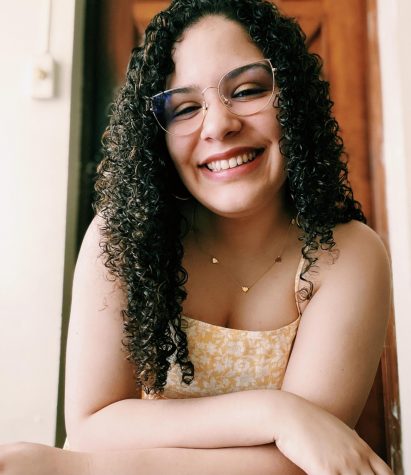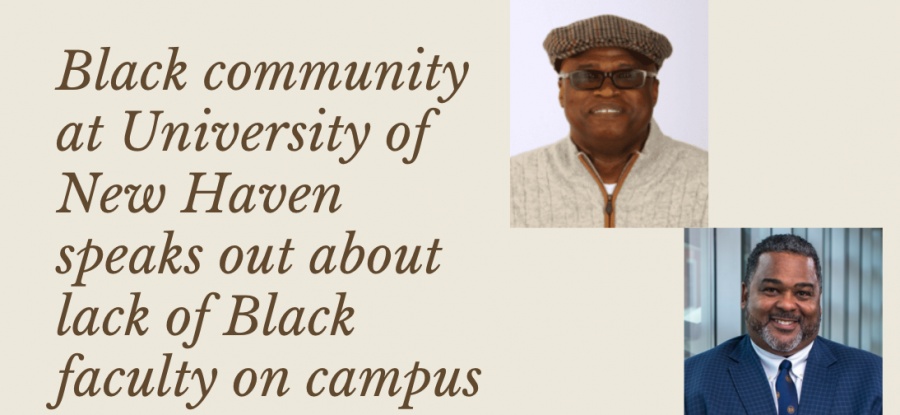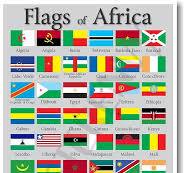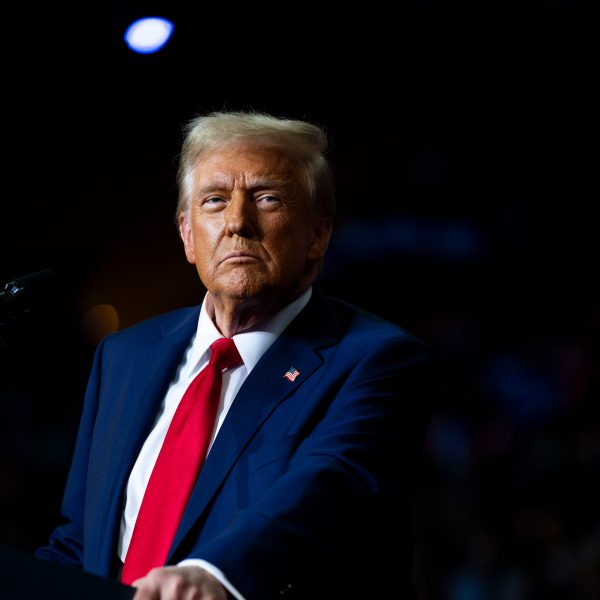Black community at University of New Haven speaks out about lack of Black faculty on campus
Graphic courtesy of Amanda M. Castro
Pictured: Horton, Boyd
In a year where overwhelming racial unrest has taken place in the U.S. and in the University of New Haven’s own backyard, increasing faculty diversity has become a priority this year for college campuses across the country. However, according to students and some professors at the university, there still is a weak presence of Black faculty on campus.
According to Inside Higher Ed, in 2017 nationally, 6% of college professors were Black. Vice president for diversity and inclusion and chief diversity officer Lorenzo Boyd said that 69% of the university’s full-time faculty is white, 31% non-white, and 9% of faculty self-identified as single-race Black/African American in the fall of 2020. A website that collects data from different universities for rank, College Factual, reported that New Haven is ranked 1,813th out of 3,750 colleges and universities in ethnic diversity nationally.
Senior political science major and university chapter NAACP president Jordan Harris said that the lack of a Black presence in the university’s faculty is disappointing because diversity on campus has not “grown as much as you would want it.”
“My major is political science, and we have no Black faculty,” said Harris. “For other departments, it’s kind of hard to find professors that will teach a course surrounding race, and if you want a Black professor, most likely, their classes fill up very quickly. Sometimes you don’t even know if you do have Black professors.”
Junior psychology major Kevise Canales-Jenkins said that the lack of Black faculty makes her feel tired. Though her first time being exposed to Black teachers was at the university, she said she wishes there were more Black faculty with whom she, a Black student, could identify.
“When you see someone that looks like you, you’re like ‘Oh my God, they could do it, so I could do it, too,’” said Canales-Jenkins. “It’s just that basic concept that would just, like, spark so much passion in people and drive.… Just like the basic thing that you see someone that looks like you.”
Canales-Jenkins also said that she was the only Black person in her race, class and gender in criminal justice class and that her professor pulled her aside to warn her about the topics that would be discussed in class so that she would not feel “singled out.”
“I mean, I know that a lot of universities are now like, ‘we have to get more Black professors,’ and so there’s a large push to get them,” said Harris. “At the same time, I think maybe [the university] should be more creative in [their] ideas and do more searches to hire to get more people in here.”
Canales-Jenkins said although she understands that it may be difficult to find Black professors, she thinks the university should be doing more to hire them.
Boyd said that there is “absolutely” a lack of Black faculty at the university and that it’s “a higher ed issue in general.”
“Not all universities are like that because before I came here,” said Boyd, “I was a department chair at an HBCU (Historically Black Colleges and Universities) and we did not have a dearth of Black and Brown faculty – that was the norm. Most of our faculty were Black and Brown at HBCUs…I’ve worked in HBCUs and I also worked in PWI’s (Predominantly White Institutions), and there is, in fact, a difference.”
Boyd said that the only way to hire more Black and Brown faculty is to simply do so.
“When you have no Black and Brown faculty, it’s hard to attract them,” he said.
“The toll that it has on Black faculty being in low numbers, we get what I like to call the ‘black tax,’” said Boyd, “so if there’s only three or four Black faculty, guaranteed, whenever there are students of color that need help, we have to jump in or whenever there’s a diversity issue, we have to rule on it because there are not enough people to go around so the few Black people that you have that are good, tend to get overtaxed and get the worn out and that becomes problematic.”
Professor in the university’s English department Randall Horton said that for 11 years he has been the only full-time Black professor in his department. He also said that having few Black professors on staff makes him “frustrated,” but that it is because of a lack of interest in applying for a position at the university.
“A lot of times, people aren’t even applying for these positions, so that’s a problem,” said Horton. “But I think we can be more targeted.”
Canales-Jenkins and Harris said that though they have not had many Black professors, the few that they had have made impacts on their student life.
“Our Black and Brown students need role models,” said Boyd. “They need to be able to see that that’s who they can be if the only role model they have is a white person that doesn’t have the same living experiences that you have… They could still mentor you, but there’s a piece missing.”

Amanda is a senior majoring in communication with a concentration in journalism, and a double minor in political science and English. She has been involved...








